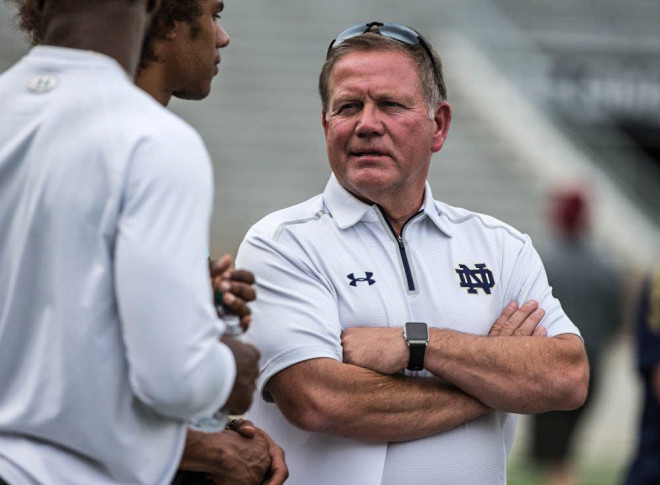Notre Dame, Brian Kelly Pursue 'Seventh Heaven' Football In 2016

Last year’s popular good-luck omen for the Notre Dame football team was having the first Triple Crown winner in 37 years (American Pharoah). In the 11 previous years that horse racing had such a feat, Notre Dame recorded a 97-8-5 record (.905 winning percentage), with eight of those seasons resulting in an unbeaten season and/or a consensus national title.
The positive history continued in 2015 with a 10-1 start and taking a 36-35 lead at Stanford with 30 seconds left in the regular season finale, but a defensive collapse resulted in the defeat and ultimately finishing No. 11 in the AP poll (still the third-best placement since 1993).
This year’s hopeful good-luck omen is Lucky Number 7.
Among the 15 full-time, non-interim head football coaches at Notre Dame since 1913 — beginning with Jesse Harper when he also became the school’s first athletics director — Brian Kelly is the sixth to reach his seventh season. The results from the other five were a combined 47-4-1 record for a .913 winning percentage, including a couple of consensus national titles and two one-loss seasons:
Knute Rockne
Year Seven: 1924
Result: 10-0, consensus national title
Although Rockne had steered the George Gipp-led units to unbeaten seasons in 1919 and 1920, this resulted in the first consensus national title campaign in the school’s history.
The program also was becoming “America’s Team” with its national schedule, traveling East to play traditional power Army — the game in which sports writer Grantland Rice coined the immortal Four Horsemen backfield — and West to defeat unbeaten Stanford, coached by Glenn “Pop” Warner in the Rose Bowl, 27-10.
Rockne coached 13 seasons before his death in a plane crash at age 43 on March 31, 1931.
Elmer Layden
Year Seven: 1940
Result: 7-2
With the weight of immense expectations overwhelming him, 7-2 was not good enough, so Layden resigned a couple of months after this season to become commissioner of the NFL.
His career record at Notre Dame was 47-13-3 for a .770 winning percentage, better than Hall of Famers Lou Holtz (.765) and Dan Devine, who was .764 in six seasons from 1975-80. However, unlike Holtz and Devine, Layden never won a national title, with his No. 1 Irish losing in the finale at USC in 1938 (13-0).
Layden is the one former Notre Dame coach whose career seems to mirror Kelly’s, now that he too is in his seventh year and came close to a national title in 2012 before his No. 1-ranked team lost to Alabama (42-14) in the finale.
Frank Leahy
Year Seven: 1949
Result: 10-0, consensus national title
This concluded an astounding run for Leahy in the 1940s when his record was 71-3-5 (.930), including 11-0 in his final season at Boston College (1940) prior to accepting the Notre Dame post. (He served overseas in World War II in 1944 and 1945).
Including 1943, this was Leahy’s fourth national title in the five seasons he coached from 1943-49. It was also the only time he finished with 10 wins at Notre Dame while playing mainly nine- or 10-game seasons.
Ara Parseghian
Year Seven: 1970
Result: 10-1, No. 2 finish
Led by quarterback Joe Theismann, the Heisman Trophy runner-up, and a defense that allowed only 9.7 points per game during the regular season, the campaign concluded with a 24-11 upset of No. 1 and defending national champ Texas in the Cotton Bowl, snapping the Longhorns’ 30-game winning streak.
The national title was awarded to 11-0-1 Nebraska, which rallied in the fourth quarter of the Orange Bowl to defeat SEC champ LSU, 17-12.
Lou Holtz
Year Seven: 1992
Result: 10-1-1, No. 4 finish
Like Parseghian’s 1970 team, this one capped the campaign with a resounding 28-3 Cotton Bowl triumph against another unbeaten team, 12-0 Texas A&M.
On paper, this actually might have been Holtz’s most talented team. Eleven of the 22 starters on offense and defense were first- or second-round draft picks, including the backfield comprised of quarterback Rick Mirer, fullback Jerome Bettis and tailback Reggie Brooks, who finished fifth in the Heisman voting.